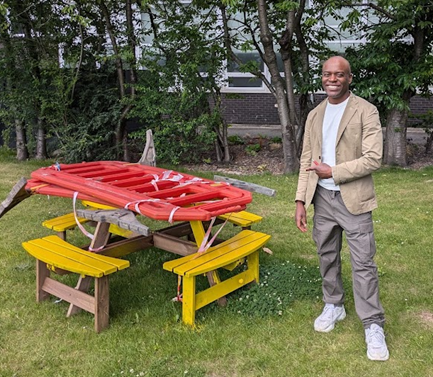Running for Community Healing: Why I Ran the Manchester 10K for the Friendship Bench
Dr Keith Silika shares how his love for running supports community health and resilience, his research work into informal community dialogue as a powerful means for preventing harmful practices, and explains all about the Friendship Bench and the Bee Bench.
by Dr Keith Silika
08 July 2025
Earlier this year, I ran the Manchester 10K not just for fitness or the thrill of the race, but for something much deeper—community mental health and resilience through the work of the Friendship Bench. Friendship Bench Zimbabwe trains community health workers (also known as lay health workers) in partnership with the Ministry of Health and Child Care to provide basic Cognitive Behavioural Therapy with an emphasis on Problem Solving Therapy, activity scheduling and peer led group support. This task shifting approach means we can deliver an effective, affordable and sustainable solution to bridge the mental health treatment gap at a primary care level.
As someone deeply engaged in research on witchcraft accusation-related violence and harmful practices in Africa, supporting this initiative felt both personal and profoundly necessary.
From Police Officer to Researcher
My background is shaped by two seemingly distant, yet unexpectedly connected, worlds. I’m a former police officer and forensic practitioner, now engaged in academic research exploring how modern forensic science and community-based interventions can address witchcraft accusation-related crimes and ritual harm across countries like Zimbabwe, Malawi, Ghana, and Zambia. I am also a member of INAWARA—the International Network Against Witchcraft Accusations and Ritual Attacks—which brings together activists, researchers, and practitioners working to end violence driven by superstition and stigma.
This work has taken me into the heart of communities where fear, misunderstanding, and long-standing beliefs in witchcraft contribute to violence—especially targeting women, children, the elderly, and persons with disabilities. My book-in-progress, Dark Science and Detection, documents this work and offers tools for policing such crimes while respecting cultural context.
Keith running for the Friendship Bench, 2025.
A Meeting Point: The Bench and the Book
One of the recurring themes in my research is the power of informal community dialogue—the critical role played by trusted community members, especially older women, in preventing harmful practices. In many African societies, these women—often referred to affectionately as “aunties”—serve as natural counsellors, mediators, and protectors. When people can talk openly to someone they trust, misconceptions can be addressed before they escalate into violence.
The Friendship Bench model embodies this perfectly.
What started as a modest idea in Zimbabwe—empowering lay health workers, often grandmothers, to offer basic mental health support from a park bench—has grown into a globally recognised approach. It’s simple, humane principle resonates deeply with the kind of intervention I see as essential to ending witchcraft accusation-related harm: talking can save lives.
I’m especially proud that Salford University, where I am based, has embraced this concept through its own local adaptation. Reflecting Manchester’s emblem of resilience and unity, the bench will be called the “Bee Bench”. It retains the heart of the Friendship Bench’s purpose—connection, conversation, and care—while speaking directly to the local community’s identity.
Building Resilience, Dispelling Harm
Through the Friendship Bench model and its adaptations like the Bee Bench, there’s a powerful opportunity to go even further—especially in communities where belief in witchcraft is widespread. Volunteers can become a frontline defence not only against depression and anxiety but against harmful accusations and community violence.
Imagine if, alongside mental health first aid, Friendship Bench and Bee Bench volunteers were also trained in how to identify and respond to early signs of witchcraft accusations. What if they had the tools to gently dispel harmful myths, offer support to vulnerable individuals, and engage local leaders in dialogue?
As part of my ongoing research, I would welcome the opportunity to support such efforts by offering training to Friendship Bench volunteers on:
Understanding the roots of harmful practices and witchcraft accusations
Identifying early warning signs and risk factors in vulnerable individuals or groups
Basic intervention techniques that can de-escalate community tensions
How to safely and sensitively report or refer suspected cases of abuse
Such collaboration could serve as a model for community-based harm reduction, where mental health and human rights advocacy work hand in hand.
The Road Ahead—and Why I Ran
Running the Manchester 10K was symbolic for me—a journey of endurance, connection, and public commitment. Each step was powered by the belief that mental health support and community empowerment are not luxuries, but lifelines in contexts of fear and marginalisation. The Friendship Bench, much like the aunties in my research, offers not just counselling but hope—a soft landing in a hard world.
We must never underestimate the power of simple, human conversations to change lives. Whether in rural Zimbabwe or inner-city Manchester, people are seeking someone to listen, someone to understand.
As we look to expand the reach and impact of the Friendship Bench—and now the Bee Bench—I hope my small contribution, both on the racecourse and through my academic and policing experience, can help push this vision forward.
Let’s keep talking. Let’s keep running. Let’s keep healing—together.
By Dr Keith K Silika
Member, INAWARA | Researcher in Witchcraft Accusation-Related Harm | Former Police Officer



